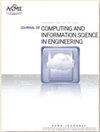计算设计合成中的深度学习:全面回顾
IF 2.6
3区 工程技术
Q2 COMPUTER SCIENCE, INTERDISCIPLINARY APPLICATIONS
Journal of Computing and Information Science in Engineering
Pub Date : 2023-12-07
DOI:10.1115/1.4064215
引用次数: 0
摘要
机器学习技术的创新应用见证了计算设计综合领域的范式转变。快速发展的范式转变要求在机器学习和计算设计综合的交叉点系统和全面地吸收现有知识。了解细微差别,确定研究差距,并概述前沿研究的未来方向是必要的。本文概述了由主题和框架综合调查组成的混合文献综述,以便在计算设计、机器学习和大数据模型的融合中实现信息的概念综合。主题文献调查旨在沿着计算设计中机器学习的更广泛主题进行深入的描述性调查。基于框架综合的调查试图将研究成果封装在一个概念框架中,以更好地理解该领域。该框架基于计算设计综合(CDS)过程,该过程由四个子模块组成:表示、生成、评估和指导。每个子模块都经过了分析,以确定潜在的研究差距和制定研究问题。此外,我们考虑了我们研究的局限性,并指出了未来研究可以扩展的领域。本文章由计算机程序翻译,如有差异,请以英文原文为准。
Deep Learning in Computational Design Synthesis: A Comprehensive Review
A paradigm shift in the computational design synthesis domain is being witnessed by the onset of the innovative usage of machine learning techniques. The rapidly evolving paradigmatic shift calls for systematic and comprehensive assimilation of extant knowledge at the intersection of machine learning and computational design synthesis. Understanding nuances, identifying research gaps, and outlining the future direction for cutting-edge research is imperative. This paper outlines a hybrid literature review consisting of a thematic and framework synthesis survey to enable conceptual synthesis of information at the convergence of computational design, machine learning, and big-data models. The thematic literature survey aims at conducting an in-depth descriptive survey along the lines of a broader theme of machine learning in computational design. The framework synthesis-based survey tries to encapsulate the research findings in a conceptual framework to understand the domain better. The framework is based on the computational design synthesis (CDS) process, which consists of four sub-modules: representation, generation, evaluation, and guidance. Each sub-module has undergone an analysis to identify potential research gaps and formulate research questions. Additionally, we consider the limitations of our study and pinpoint the realms where the research can be extended in the future.
求助全文
通过发布文献求助,成功后即可免费获取论文全文。
去求助
来源期刊
CiteScore
6.30
自引率
12.90%
发文量
100
审稿时长
6 months
期刊介绍:
The ASME Journal of Computing and Information Science in Engineering (JCISE) publishes articles related to Algorithms, Computational Methods, Computing Infrastructure, Computer-Interpretable Representations, Human-Computer Interfaces, Information Science, and/or System Architectures that aim to improve some aspect of product and system lifecycle (e.g., design, manufacturing, operation, maintenance, disposal, recycling etc.). Applications considered in JCISE manuscripts should be relevant to the mechanical engineering discipline. Papers can be focused on fundamental research leading to new methods, or adaptation of existing methods for new applications.
Scope: Advanced Computing Infrastructure; Artificial Intelligence; Big Data and Analytics; Collaborative Design; Computer Aided Design; Computer Aided Engineering; Computer Aided Manufacturing; Computational Foundations for Additive Manufacturing; Computational Foundations for Engineering Optimization; Computational Geometry; Computational Metrology; Computational Synthesis; Conceptual Design; Cybermanufacturing; Cyber Physical Security for Factories; Cyber Physical System Design and Operation; Data-Driven Engineering Applications; Engineering Informatics; Geometric Reasoning; GPU Computing for Design and Manufacturing; Human Computer Interfaces/Interactions; Industrial Internet of Things; Knowledge Engineering; Information Management; Inverse Methods for Engineering Applications; Machine Learning for Engineering Applications; Manufacturing Planning; Manufacturing Automation; Model-based Systems Engineering; Multiphysics Modeling and Simulation; Multiscale Modeling and Simulation; Multidisciplinary Optimization; Physics-Based Simulations; Process Modeling for Engineering Applications; Qualification, Verification and Validation of Computational Models; Symbolic Computing for Engineering Applications; Tolerance Modeling; Topology and Shape Optimization; Virtual and Augmented Reality Environments; Virtual Prototyping

 求助内容:
求助内容: 应助结果提醒方式:
应助结果提醒方式:


